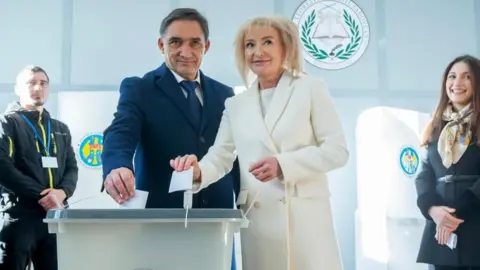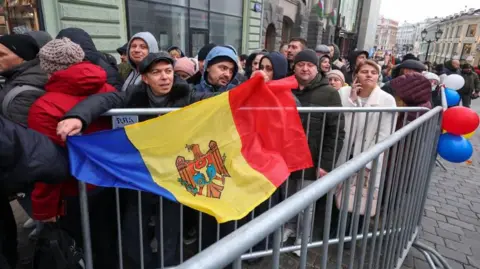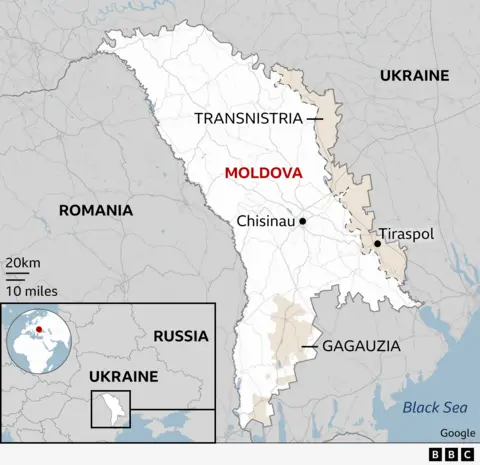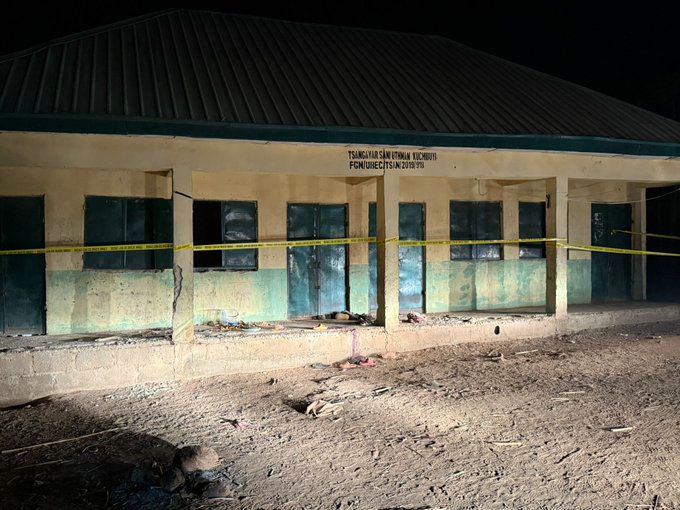
 EPA-EFE/REX/Shutterstock
EPA-EFE/REX/Shutterstock
Alexandr Stoianoglo has denied being a pro-Kremlin candidate
The man challenging Moldova's pro-EU leader Maia Sandu for the presidency has taken a narrow lead, according to preliminary results, in a pivotal presidential election run-off seen as a choice between Europe and Russia.
Alexandr Stoianoglo, who was backed by the pro-Russian Party of Socialists, had promised a closer relationship with Moscow, after Sandu spearheaded Moldova into talks on EU membership.
The Central Election Commission said with more than 89% of the vote counted, Stoianoglo was on 50.97% of the vote and Sandu 49.03%.
During the vote, the president's national security adviser said there had been "massive interference" from Russia in Moldova's electoral process that had "high potential to distort the outcome".
Russia had already denied meddling in the vote, which came a week after another key Eastern European election in Georgia, whose president said it had been a "Russian special operation".
Alexandr Stoianoglo, who was fired as prosecutor general by Sandu, has denied being pro-Kremlin.
Voting ended in Moldova at 21:00 (19:00 GMT), with a 54% turnout higher than four years ago, and especially high among expat voters at polling stations abroad. The result is likely to become even tighter as results from polling stations in the EU and the US become clear.
As polls closed, both Maia Sandu and her rival thanked voters, with Stoianoglu speaking in Russian as well as Romanian. Although Romanian is Moldova's main language, Russian is widely spoken because of its Soviet past.
Casting his ballot, he promised to be an "apolitical president" for everyone, telling reporters he had voted for "a Moldova that should develop in harmony with both the West and the East".

 Diego Herrera Carcedo/Anadolu
Diego Herrera Carcedo/Anadolu
Maia Sandu has spearheaded Moldova's drive into talks on membership with the EU
Sandu appealed after casting her ballot for Moldovans to preserve their independence, warning of "thieves" who sought to buy their vote and their country.
Presidential national security adviser Stanislav Secrieru said Russia had organised buses and large charter flights to bring voters to polling stations. Bomb scares had briefly disrupted voting in Moldova, at UK polling stations in Liverpool and Northampton and at Frankfurt and Kaiserslautern in Germany, he added.

 EPA-EFE/REX/Shutterstock
EPA-EFE/REX/Shutterstock
Moldovan expats queued to vote in big numbers in Moscow and many other cities
A Soviet republic for 51 years, Moldova is flanked by Ukraine and Romania and one of Europe's poorest countries. It has a population of 2.5 million and an expat population of 1.2 million.
Moldova's authorities have long warned that a fugitive oligarch called Ilan Shor has spent $39m (£30m) trying to buy the election for Moscow with handouts to 138,000 Moldovans.
Shor, who is based in Moscow, denies wrongdoing but did promise cash payments to anyone prepared to back his call for a "firm No" to the EU.
Commentators and politicians had warned that a Stoianoglu victory could radically change the political landscape in the Danube and Black Sea region, not because he was some kind of "Trojan horse", but rather because Russia has thrown its weight behind him.
There were queues at polling stations in Moscow, Italy and among voters from a mainly Russian-speaking breakaway region of Transnistria, who had to cross the River Dniester into Moldovan-controlled territory to vote. Transnistria is home to a Russian military base and a huge arms depot.


Moldova's election commission said it was aware of reports of organised and illegal transports of voters by air and land in Russia, Belarus, Azerbaijan and Turkey, and appealed to the public to report further violations.
Although Sandu had easily won the first round of the vote, several candidates swung behind Stoianoglo, although the third-placed candidate refused to back either of the two.
The first round coincided with a nail-biting referendum on backing a change to the constitution embracing the commitment to join the EU.
In the end the vote passed by a tiny margin in favour, and Maia Sandu said there had been clear evidence of attempts to buy 300,000 votes.

 2 months ago
25
2 months ago
25















 English (US) ·
English (US) ·